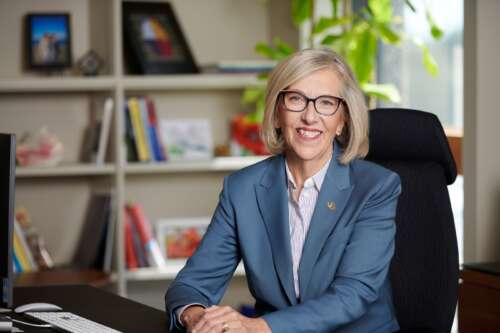
With the aim of promoting experiential learning and investing in students’ skills, the University of Guelph’s Office of the President has launched a new program to hire co-op students to work across campus.
Through the President’s Summer Co-op Initiative launched earlier this month, departments across the University can hire co-op students to assist with summer workloads, with 100 per cent of the wages being covered by the initiative.
Offering the best experiential learning in the country has long been a presidential priority and co-operative education is a key type of this learning. With more than 5,000 students across 67 co-op programs, U of G is one of the largest co-op universities in Ontario.
Co-op opportunities right on campus

“Experiential learning prepares students for navigating real-world challenges and is a core part of our mission at the University,” says Dr. Charlotte Yates, U of G president and vice-chancellor.
“We are delighted to offer opportunities to allow students to engage directly in positions right on campus where they can apply their learning.”
Many opportunities abound on campus to provide students with fantastic learning opportunities that merge well with their areas of study, says Elaine Fenner, director of experiential learning at U of G.
“We want all our co-op students to gain high-quality work experiences that are relevant to their areas of study. With so much interesting research going on, the University is an ideal place for students to work, with lots of great advanced positions,” she says.
Many high-quality work experiences available
Some of the opportunities that students have been able to secure through the President’s Summer Co-op Initiative include:
- soil spectroscopy research assistant, within the School of Environmental Sciences
- carbon capture and storage analyst, within the School of Engineering
- cybersecurity research intern, within the School of Computer Science
- sports data analyst in the Lang School of Business and Economics
Fenner notes the country’s challenging housing market has left many co-op students reticent to leave their residences in Guelph and search for affordable housing in other urban centres.
“The President’s Initiative allows students to stay in Guelph — a city that many of them have fallen in love with — so they can complete their work terms,” says Fenner.
While there have been co-op positions on campus before, this initiative increases accessibility substantially and ensures that University departments can increase the number of work positions they offer, with all costs covered by the Initiative.
Students begin their new work terms June 10 and will complete 35 hours a week until late August.
